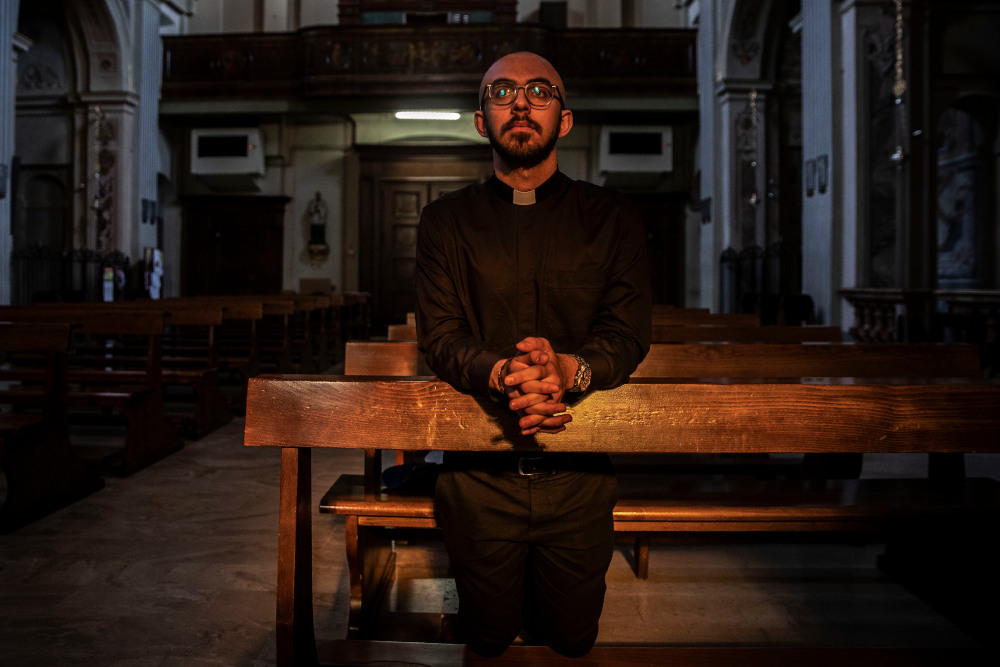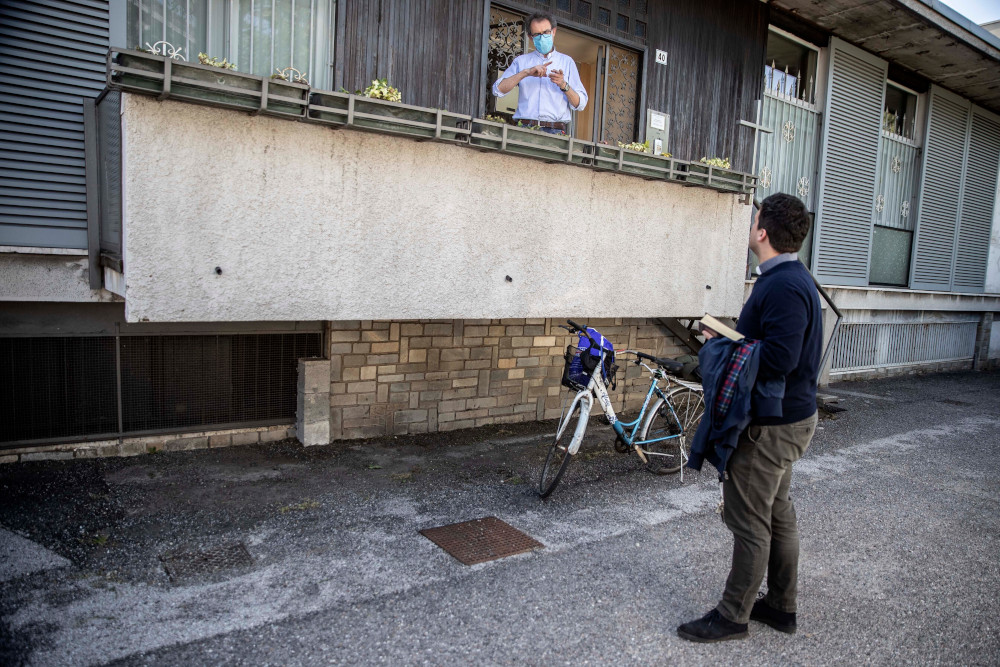
Seminarist Francesco Alberti prays at the Fermo and Rustico Saints church in Cusago, Italy on Thursday, April 30, 2020. With coronavirus raging outside and inside Europe's largest diocesan seminary, the nearly 130 young men studying to become Catholic priests at the Seminario di Milano in northern Italy were confined strictly to their rooms for weeks. (AP/Luca Bruno)
When coronavirus struck inside Europe's largest diocesan seminary, it upended the intense educational routine and spurred soul-searching among the nearly 130 young men studying to become Catholic priests.
At Seminario di Milano in northern Italy, which has been preparing clergy since the mid-1500s, communal life turned into strict confinement to individual rooms, classes and Masses moved online, and charitable outreach worked only on social media. Outside, COVID-19 killed more than 119 Italian priests, accelerating a long-term decline in clergy numbers so steep Pope Francis dubbed it a "hemorrhage."
"The situation is truly dramatic," said Paolo Timpano, 26, who after testing negative for the virus had to move out of the seminary into his parents' home in the Milan suburb of Rho. "But perhaps especially so in the context of the church as we were used to conceptualize it, to live it here, of some long-held paradigms … to which we owe a lot, a huge amount, but that are not … our foremost mission."
With more clergy dying yearly than being ordained even before the pandemic, and a European average of 65 seminarians per million baptized Catholics, according to the Vatican, Timpano and his classmates won't be able to refill the ranks.
Instead, they see a crucial opportunity to reimagine the role of priests, thinking outside the box to find ways to refocus on faith's essentials and involve the laity in the church's many ministries.
Take the town where Timpano volunteers, down in the last decade to one priest for six parishes and 47,000 residents. "How can you even just meet every week or once a month that many people," the seminarian worries. "A shepherd needs to meet his flock, that's the example that Jesus gave us in the Gospel, and the flock needs to be known by the shepherd. This change requires of us a great conversion, and also a great assumption of responsibility on the part of lay people."
That change could affect Italian society well beyond the steeple's shadow. Aside from religious ministry, priests and nuns are relied upon not only as a social safety net –- from drug addiction and immigrant outreach to nursing homes –- but also for much social programming, from after-school sports to summer camps.

Seminarist Paolo Timpano, right, keeps his distance as he talks to Parson Don Alberto at the San Giovanni Battista church parish house in Rho, northern Italy on Friday, May 8, 2020. With coronavirus raging outside and inside Europe's largest diocesan seminary, the nearly 130 young men studying to become Catholic priests at the Seminario di Milano in northern Italy were confined strictly to their rooms for weeks. (AP/Luca Bruno)
"That's all wonderful, but as long as it's subordinated to the main thing, which is to love God and to love and take care of others," said Francesco Alberti, 22, from his small town's parish, where he's staying after recovering from COVID-19 until he can return to the seminary. "That is what first won me over."
Alberti and other seminarians say they were inspired by the core values of faith and charity that their childhood parish priests embodied, not by scintillating homilies or full activity agendas.
"Seeing (the priest) celebrate Mass with wide-open arms, one day I said, 'What does this man have? … Why does it attract me so much? … I want to be like him,'" Manolo Lusetti said while quarantined in his room at the seminary. He entered in his mid-30s, after feeling more satisfaction bringing Holy Communion to a nursing home than in his successful political career.
Seminarians are taught that a priest must be above all a firm believer who inspires by example, not an "official" in a role or even a "superhero" who does everything alone, said the Seminario's rector, Rev. Monsignor Michele Di Tolve.
"Because what youth ask you today is 'But do you believe in what you say? Do you actually live it?' Then you're credible," Di Tolve said from the seminary where a dozen students were still quarantined nearly two months into the lockdown.
If they'll be able to count on lay people pitching in to organize soccer practice or charity food distribution, even reduced numbers of priests will have time to prioritize the sacraments that only clergy can minister and to meet meaningfully with their communities — wherever they might be.
While confined to their rooms, some seminarians recorded mini homilies on the day's Scriptures they messaged to groups they used to volunteer with on weekends but couldn't reach during the lockdown.
To move forward will take similar creativity, without insisting "'OK, let's go back to old ways.' No! The church today must be constantly a creative church," Lusetti said.
Most of all, the seminarians hope to build a church where people find a home and feel loved and "listened to," Alberti said.
"Church is not the priests, it's all the baptized," he said. "The only thing we can't let go is our faith."
Advertisement







